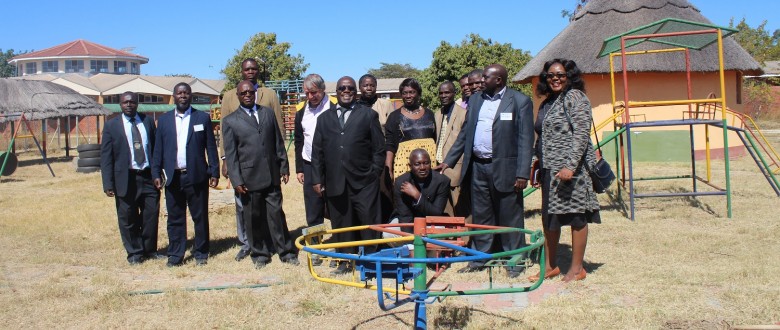
Zimbabwe and Zambia experience challenges in providing their youngest learners with quality early childhood education (ECE). Considering the fundamental importance of quality ECE equity in education, VVOB organised a workshop on Educational Leadership and Change Management for principals of teacher education colleges from Zimbabwe and Zambia in Harare to share experiences and possible strategies.
Pivotal leadership
Zambia and Zimbabwe share quantitative and qualitative challenges in ECE teacher development. ECE teacher development used to be in the hands of private colleges and was carried out without any standardisation. Today, public authorities are responsible for teacher development. As this is still in its nascent stages, principals of teacher education colleges are pivotal in providing transformative leadership to enable the colleges to successfully deal with the challenges in ECE.
The five-day workshop, jointly organised and facilitated by VVOB Zambia and VVOB Zimbabwe, brought together seven teacher education college principals from Zambia and two teacher education college principals from Zimbabwe. The Acting Director for Tertiary Education Programmes Ministry of Higher and Tertiary Education Science and Technology Development (MHTESTD-Zimbabwe) and the senior Programme Officer for Teacher Education and Specialised Services (TESS-Zambia) also joined.
Change, mentoring and coaching
The college leaders were introduced to the trends and challenges in ECE to enhance their appreciation of thinking globally and acting locally in ECE teacher development. This was followed by the eight dimensions of school leadership to provide them with a framework to improve teacher development in their respective colleges (see below).
The pressing need for change to improve the quality of teacher development became the rallying slogan. But change is not easy and has to be well planned. Participants shared their thoughts on and experiences in trying to bring about innovative practices in their institutions, in dealing with resistance and in harnessing incentives to promote change. Through a grounding in the change models of Knoster, Kotter, Kurt Lewin, Ely and Gleicher, the participants acquired useful tools to guide their change management.
The third day was dedicated to mentoring and coaching, critical recipes for teacher quality. It was noted that Zambian pre-service students do two terms of teaching practice while their Zimbabwean counterparts do five terms. During teaching practice, student teachers requite mentorship and coaching by lecturers and school-based mentors which underscores the need for capacity development of these actors in mentoring and coaching.
South-South exchange
The learning exposure visits to Seke Teachers’ College and the Department of Teacher Education (DTE) of the University of Zimbabwe created a concrete platform for peer learning. As they shared their different practices, each participant did an introspection and reflected on what to take back home and on how to implement some of the best education practices in their own colleges. Zambian colleagues acknowledged the important role of DTE in quality assurance and in supporting capacity development activities for the colleges.
All participants appreciated what they had learnt during the workshop and the learning exchange visits, and expressed a desire for more exchange visits of this kind in the Southern African Development Community. A legitimate expectation indeed since there are initiatives in this regional block to establish a common Teacher Professional Council, and to craft guiding frameworks for Teacher Development and Teacher Competences.




